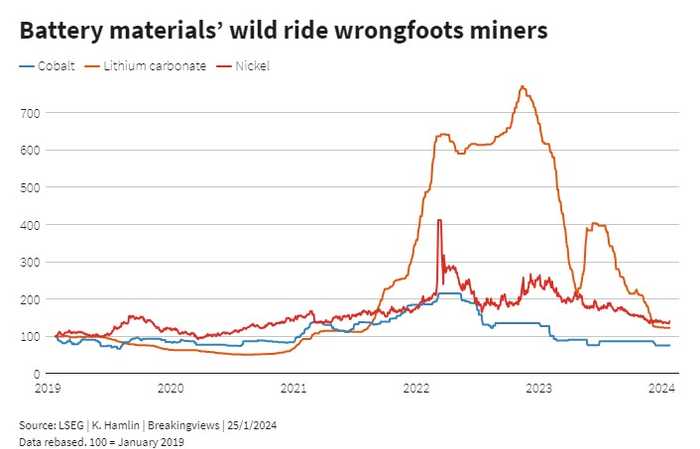Published 12:18 IST, January 31st 2024
Battery minerals pressure causes cracks Down Under
EV makers are ensuring to have enough lithium, nickel and cobalt for sustained rapid uptick in EV sales.
Advertisement
Critical condition. Mining metals crucial for the energy transition is often regarded as one of the ways Australia can wean itself off its exports dependence on coal, gas and iron ore. At present, though, there’s more fear than greed in the industry as demand for electric vehicles cool. On Wednesday, for example, miner IGO revealed it would freeze operations at its Cosmos nickel project – key to its $1.3 billion ($827 million) takeover of rival Western Areas just 18 months ago. IGO is not the only company facing problems, but its own decisions have compounded its pain.
There was plenty to get excited about at the start of the decade as carmakers from Tesla to Volkswagen to BYD wanted to ensure they had enough lithium, nickel and cobalt for what was hoped to be sustained rapid uptick in EV sales. The price for all three ingredients at least doubled roughly between 2021 and 2022. But they have since gone into reverse as deliveries of new EVs, while still growing, are lower than many expected and manufacturers like Ford Motor and General Motors have cut investments.
Advertisement

At just over $16,000 a tonne, for example, the price of nickel has almost halved over the past 12 months, with a glut of cheap supplies from Indonesia prompting concerns it could be a structural rather than cyclical shift. BHP two weeks ago warned it’s assessing the carrying value of its nickel assets.
The mining behemoth run by Mike Henry still gets most of its revenue from iron ore. IGO is more exposed, having decided in 2021 under previous boss Peter Bradford to sell its gold assets to focus on battery metals. A joint venture with China’s Tianqi Lithium is now struggling too: overall lithium production fell a tad last quarter, and the business did not sell any of the 617 tonnes of lithium hydroxide it refined, leaving it with five times that amount in inventory.
Advertisement
The main source of IGO’s problems, though, is bad dealmaking. It overpaid for Western Areas and fell short on due diligence, discovering after it took possession that costs were higher and production issues more challenging than expected. That, not the commodity rout, sparked a A$970 million writedown in July; there’s a hit of up to A$190 million more coming, it warned on Wednesday.
IGO is not the only one ruing an acquisition: Wyloo, owned by Fortescue Chair Andrew Forrest, will in May halt operations at a nickel business it paid $500 million for last year. Unless commodity prices bounce back, more battery minerals players, both Down Under and elsewhere, risk being hobbled.
Advertisement
12:18 IST, January 31st 2024
